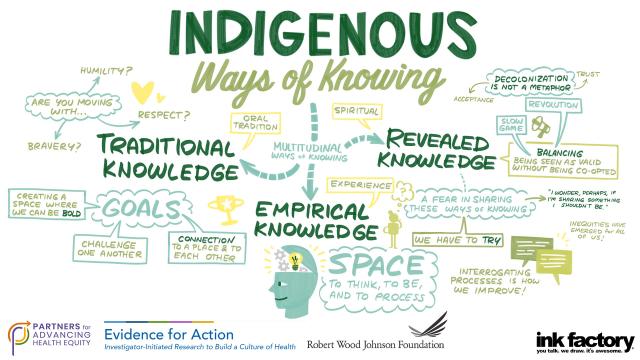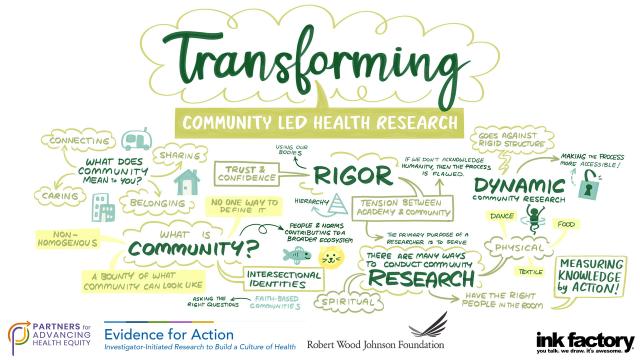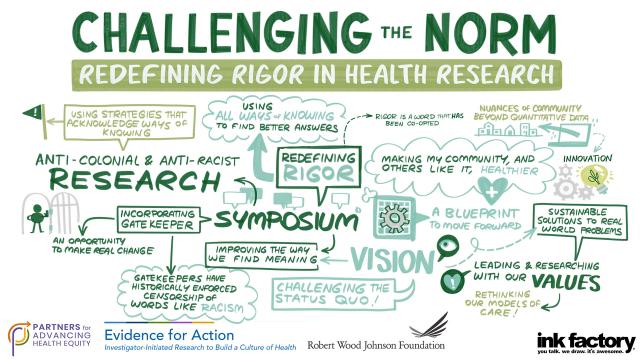Over the course of 2024, Evidence for Action (E4A) and Partners for Advancing Health Equity (P4HE), with co-organizers across the country, will convene five Ways of Knowing symposia. On March 7, 2024, we kicked off the series at the Tulane School of Public Health and Tropical Medicine in conversation with the co-organizers around the ways they gather knowledge, elevate community-led health research, and challenge entrenched research norms. The kick-off offered a preview of the forthcoming gatherings, and we’re recounting some of the highlights here.
Ways of Knowing Symposia Overview

Art by Reilly Branson on behalf of Ink Factory
Drs. Amani Nuru-Jeter, E4A Director, Thomas LaVeist, P4HE Director,and Alonzo Plough, RWJF Chief Science Officer, laid the foundation for the kickoff’s conversations by highlighting the limitations of what we have considered and currently consider knowledge. While progress has been made in some areas of racial health equity, many inequities have persisted. They emphasized the need for collective pressure in the continuation of knowledge building to counter the effects of structural racism and colonialism. As Dr. Nuru-Jeter highlighted, understanding “the improvement in population health is not the same as [understanding] the causes of inequities.” The need to thoroughly dissect how we obtain (and have obtained) knowledge and to intentionally expand current methods are dire. Dr. LaVeist honed in on the structures of power in which knowledge can be gained, sharing that a singular way of knowing has dominated the ways in which we understand health with clear boundaries around who sits in positions of power to improve health and disrupt inequity. He also stated that we must use the levers of institutional power to make change. Dr. Plough emphasized the need to transform what he termed the health science knowledge system, which include funders, researchers, journal editors, and the academy among others, to be more inclusive of community voices.
Indigenous Ways of Knowing

Art by Reilly Branson on behalf of Ink Factory
Dr. Melissa Walls then joined Dr. Nuru-Jeter in conversation to set the stage for the Indigenous Ways of Knowing Symposia, an intimate gathering of Indigenous scholars to be held in May in Pray, Montana. Dr. Walls highlighted three pillars of Indigenous Knowledge: traditional (i.e., pre-colonial ways of knowing such as of oral traditions), empirical, and revealed knowledge (i.e., intuition or sense of spirit). She noted that “decolonization is not a metaphor” and that decolonizing knowledge systems is a necessity. Dr. Walls called for an active change in our gaze to expand current ways of knowing to protect and share knowledge. Dr. Walls, her co-organizer, Dr. Joseph Gone, E4A, P4HE, and RWJF look forward to holding space for Indigenous scholars to think, process, and reflect on the Indigenous ways of knowing and the ways in which they may or may not integrate with Western ways of knowing.
Transforming Community-Led Health Research

Art by Reilly Branson on behalf of Ink Factory
Dr. Charisse Iglesias and Joy Williams, in a discussion moderated by Dr. Claire Gibbons, shared a bit of the energy of the symposium they’re co-organizing on transforming community led health research in Greenville, North Carolina this August. Joy and Charisse began the conversation discussing the unproductive dichotomy of the academy and communities in which researchers operate. They emphasized the urgency of redefining the role of the researcher and the definition of rigor in science, highlighting that community-led and community-engaged research is not mutually exclusive with rigor. Joy pointed out that rather than the role of the researcher being to provide knowledge, the role can be altered, redefined, and enhanced to better serve communities and recognize a reciprocal learning relationship where community members are also providing knowledge. Charisse and Joy aim to have an interactive, culturally immersive, peer-learning symposium in August to lift up what is needed to better support authentic community leadership in research.
Challenging the Norm: Redefining Rigor in Health Research

Art by Reilly Branson on behalf of Ink Factory
Drs. Tongtan “Bert” Chantarat and Melody Goodman, in a conversation moderated by Dr. LaVeist, discussed how challenging the norm of how rigor is defined in health research requires disrupting the current status quo maintained by gatekeepers (e.g., journal editorial boards, funding agencies, university tenure committees, etc). While the current ways of knowing generated using quantitative, qualitative, and mixed-methods approaches are valid and important, they may not be sufficient (and are certainly not the only means) for interrogating racist structures in purposeful systematic ways. Dr. LaVeist shared that we should use “all ways of knowing to get to the best possible answer to address the [research] question.” Often rigor is defined in a way in which gatekeepers continue to determine what is deemed important and worthy of understanding. There are many ways we can redefine rigor to encompass more than merely methodological approach, such as what sort of solutions it produces and for whom, and whether it influences action. Dr. Chantarat highlighted that research needs to be about more than curiosity and thought experiments. Dr. Goodman pointed out that it is necessary to include gatekeepers in these discussions, as they are the individuals who can directly drive change. Drs. Chantarat, Goodman, and co-organizer Dr. Adolfo Cuevas are enthusiastic about the opportunity to work with both researchers and gatekeepers to develop a blueprint for advancing the widespread adoption of anti-racist and anti-colonial research approaches in the health sciences field during the symposium in October.
Conclusion
From the conversations with the symposia co-organizers and the active engagement of the online and in-person audience, the kickoff event concluded with words from the P4HE & E4A Deputy Directors, Omar Dauharjre and Dr. Erin Hagan, noting that the ultimate goal of the symposia is to co-create space where we can reimagine the health science knowledge system in community together, with bravery, respect, and humility. Join us in our communal journey toward broadening ways of knowing to be more inclusive and actionable.
Save the date for the hybrid kickoff, being held in conjunction with Facing Race on November 20, 2024 in St. Louis.
Resources
- Full recording and illustrated notes from the Kickoff.
- E4A Ways of Knowing Symposia Information
- Indigenous Ways of Knowing readings suggested by Dr. Melissa Walls:
- Thoughts on an Indigenous Research Methodology by Evelyn Steinhauer
- Updating Aboriginal Traditions of Knowledge by Marlene Brant Castellano in the book Indigenous Knowledges in Global Contexts: Multiple Readings of Our World
- Reimagining global health: from decolonization to indigenization by Suzanne Hindmarch and Sean Hillier